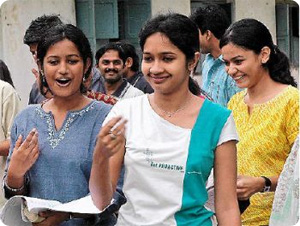Entrance tests for Management

The entrance tests are designed with a view to objectively measure the aptitude of the candidate, and the general skills as expected of a would be manager or an organizer. The entrance tests are of multiple-choice type, where each question is provided with multiple options/ answers (generally four choices) and the candidate has to choose the right one.
Eligibility:
Generally, the management programs are open to all the streams of study.
The Contents of the Entrance Tests (Step. 1)
The Entrance Tests broadly consist of the following sections :
1. Verbal Ability Test: The entrance test in Verbal Ability consists of questions based on:
- Antonyms
- Synonyms
- English Usage
- Sentence Sequencing
- Sentence Completion
- Logical Arrangements and
- Arguments
2. Reading Comprehension Section: The entrance test in reading comprehension section consists of questions based on Passages.
3. Quantitative Ability Test: The entrance test in Quantitative Ability Test section consists of the following content:
- Number Systems
- Percentages
- Ratios and Proportions
- Profit and Loss
- Interests
- Timework
- Time-Distance
4. Data Interpretation Skills: The entrance test in Data Interpretation Section consists of the following topics:
- Charts and Tables,
- Graphs and Functions based problems.
5. Logical Ability Test: The entrance test in Logical Ability Test section consists of the following content:
- Analogies
- Logical Clustering,
- Mathematical Logic,
- Critical Reasoning and
- Puzzles
6. General Awareness Tests: It aims at checking the level of general awareness among the candidates.
The pattern of the Entrance Test:
The pattern of the entrance test may vary from institute to institute. Some may have or may not have all of the above sections. The number of questions per section and the marks assigned for a correct answer in each section may also vary. The pattern of the entrance tests generally changes every year.
Details of the tests:
- Duration of the test: 2 to 3 hours
- Total no. of questions asked: 150 - 250.
- Parameters for assessing the student:
a. The accuracy and speed of answering the questions are considered important in the entrance tests as it indicates the ability of the individual to handle the pressures.
b. The focus is on the overall performance, with reasonably good performance in each section.
c. Further, one has to score a minimum of marks in each section to be eligible for being considered for over all ranking.
- Group Discussion and Personal Interview (Step 2)
Some business schools / institutes adopt Group Discussions in the selection process while some do not. Students qualifying in the entrance test are invited for a Group Discussion. A Personal Interview further follows this. The Group discussions are the first occasion on which the candidates meet and interact with the faculty and other members.
On an average 6 to 12 candidates are invited for this phase of the selection process for every seat offered. In a Group Discussion the candidates discuss the topic given to them with the faculty for a duration of 15 - 25minutes.
On basis of the Group Discussion, the candidate's ability is assessed in terms of:
- Behavior.
- Communication skills.
- Contribution of ideas facilitating a discussion.
- The range and depth of his / her knowledge on topics of general interest
- Initiative and leadership qualities.
The Personal Interview process normally takes place after the group discussions. In this interview, besides the validation of the information provided by the candidate in the application form, a candidate`s suitability for the management program is assessed on basis of various personal attributes such as confidence, body language and ability to handle pressure.
Other requirements
- Past academic records: Due weightage is given to a candidate's past academic performance also during the selection process.
- Work Experience: Appropriate weightage is also given to candidates having at least 6 months of full-time work experience.
Selection Process:
Admissions to most of the Business Management Programs are carried out on the basis of interest and aptitude. Admissions are made on the basis of:
- Academic performance
- Performance in Entrance Test
- Performance in Group Discussions
- Performance in Personal Interview and
- Work Experience (for Managers)
List of Management Entrance Exams:
- Common Admission Test - (CAT)
- Xaviers Admission Test - (XAT)
- Joint Management Entrance Test - (JMET)
- Indian Institute of Foreign Trade (IIFT) Entrance Examinations
- Management Aptitude Test - (MAT)
- OPEN Management Admission Test - (OPENMAT)
- AIMS Test for Management Admission - (ATMA)
- Commonwealth Executive Management Admission Test -(CEMAT)
- Graduate Management Admission Test - (GMAT)
| |
Other Categories
Entrance tests for Management
Entrance tests for Engineering
Medical Entrance Examination
Common Admission Test (CAT)
International Examinations
Law School Admission Test (LSAT)
Medical College Admission Test (MCAT)
Graduate Management Admission Test(GMAT)
Graduate Record Examinations (GRE)
International English Language Testing System (IELTS)
Scholastic Aptitude Test (SAT)
Test of English as a Foreign Language (TOEFL)
Commonwealth Executive Master of Business Administration Test (CEMAT)
Main Categories
Foreign Degrees in India
Career Options after HSC
Entrance Test Examinations
International Examinations
Competitive examinations in India
Education in India
Colleges In Indian States
Medical Colleges in India
Management Courses in India
Engineering Courses in India
Professional Courses in India
Academic Degree Course In India
Education Governing Bodies
Indian Education System
Women Education in India
Structure of Indian Education
IITs in India
Development of Education in India
Online education in India
Gurukul
Education in Modern India
|

